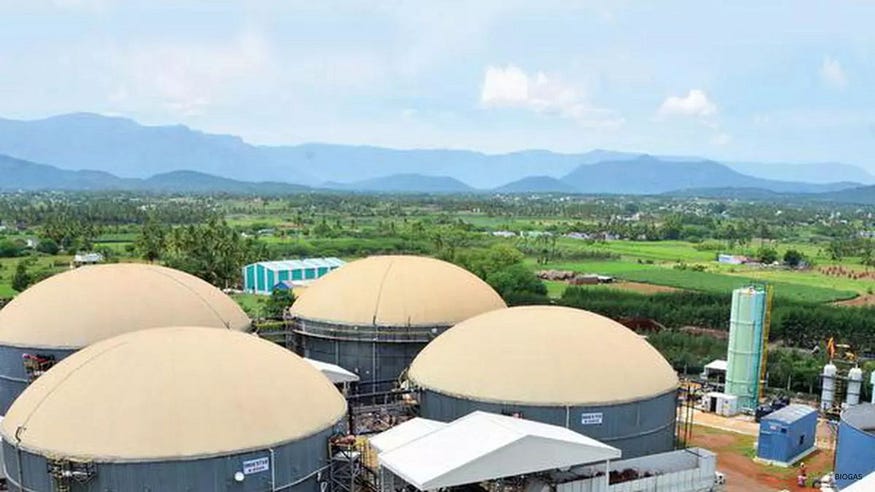Biogas in Kerala: Optimize Your Biogas Plant and Increase Your Return on Investment!

With rising interest in renewable energy, biogas in Kerala has emerged as a promising solution for sustainable energy production. Biogas plants not only help reduce waste but also generate valuable energy, which can provide substantial economic benefits. For biogas plant operators in Kerala, optimizing plant efficiency can lead to improved output, lower operating costs, and a better return on investment (ROI). This article explores key strategies for optimizing biogas plants in Kerala and maximizing ROI.
Why Biogas in Kerala?
Kerala’s organic waste, from agricultural residue to food and animal waste, provides abundant feedstock for biogas production. The state’s tropical climate is favorable for the digestion process, enabling higher biogas yields. By optimizing biogas plants, Kerala can harness this potential to reduce waste and promote clean energy.
Strategies for Biogas Plant Optimization
1. Optimize Feedstock Composition
The composition and quality of feedstock greatly impact biogas production. In Kerala, operators can take advantage of diverse organic waste sources, including agricultural residues and food waste. Combining various types of feedstock helps increase microbial efficiency, which can lead to higher biogas yields.
Tip: Regularly monitor feedstock composition and adjust ratios based on seasonal availability to ensure optimal methane production.
2. Maintain Optimal Temperature and pH Levels
The tropical climate of Kerala benefits biogas production; however, temperature fluctuations can still affect output. Maintaining a stable temperature in the digester is essential for consistent microbial activity. Insulating biogas digesters and using temperature control mechanisms can significantly boost efficiency.
Tip: Keep pH levels between 6.8 and 7.2 to promote healthy bacterial growth, leading to enhanced biogas output and better ROI.
3. Invest in Mixing Technology
Uniform mixing of feedstock within the digester is vital to prevent scum formation and increase the contact between microbes and organic matter. In Kerala, incorporating low-energy mixers in traditional biogas plants can be a cost-effective way to boost biogas yields.
Tip: Consider continuous or periodic mixing based on your plant design and feedstock to maximize gas production.
4. Upgrade to Modern Biogas Technology
Many biogas plants in Kerala still rely on traditional technology. Upgrading to advanced digesters, two-stage digestion systems, or gas purification technology can enhance biogas yield and improve ROI. Automation, in particular, allows operators to monitor production and reduce labor costs.
Tip: Investing in modern technology is an upfront cost that pays off in terms of increased gas yield and higher overall efficiency.
5. Use Additives to Enhance Microbial Efficiency
Certain additives, such as trace minerals, enzymes, and microbial inoculants, can improve bacterial efficiency and boost biogas production. Operators in Kerala can experiment with eco-friendly additives, like cow dung slurry, to achieve higher methane production and greater returns.
Tip: Conduct trials with different additives to find a sustainable option that enhances productivity.
6. Implement Regular Maintenance and Monitoring
Routine maintenance and monitoring are essential to optimize biogas plants. Regular inspections for leaks, blockages, and digester level checks can prevent potential issues and ensure consistent production. Digital monitoring systems are highly effective for tracking production, temperature, and other essential metrics.
Tip: Monitoring systems can help track biogas production and maintain optimal conditions, saving time and reducing repair costs.
7. Explore Energy Utilization and Waste Heat Recovery
For larger biogas plants, using combined heat and power (CHP) systems can enhance overall energy output. By utilizing waste heat generated during biogas combustion, operators can produce additional energy, improving plant efficiency and financial returns.
Tip: Waste heat recovery setups can be particularly beneficial for larger biogas plants in Kerala, enhancing both productivity and ROI.
Financial Benefits of Optimized Biogas Plants in Kerala
Optimizing biogas in Kerala not only improves sustainability but also enhances economic outcomes. Higher production levels reduce the need for supplementary energy sources, and by maximizing methane output, plants can increase their revenue streams. With incentives for renewable energy, Kerala’s biogas operators can capitalize on financial support, reducing investment payback periods.
Conclusion
By optimizing biogas plants in Kerala through feedstock management, temperature regulation, mixing technology, and modern upgrades, plant operators can significantly increase their ROI. Investing in efficient, sustainable practices helps Kerala move closer to its renewable energy goals while providing financial gains for biogas investors. With careful management and a focus on optimization, biogas in Kerala can be both environmentally and economically beneficial.

Comments
Post a Comment